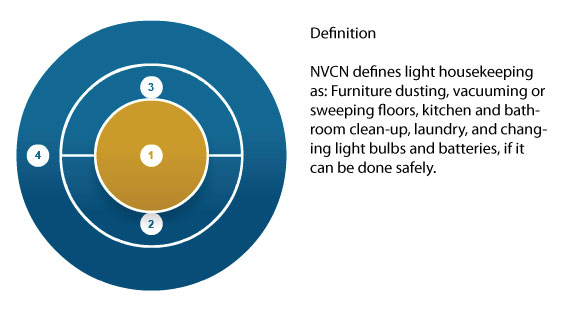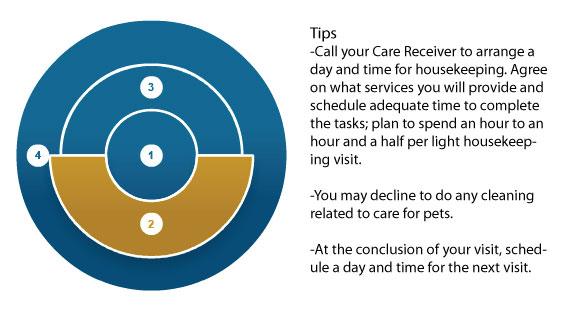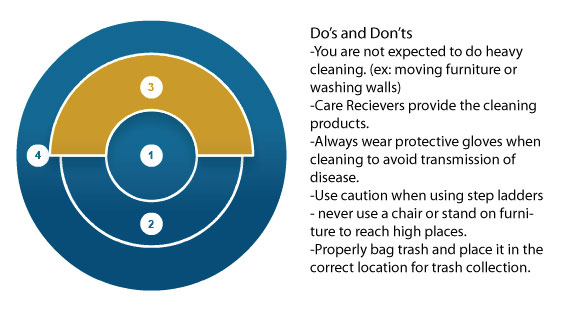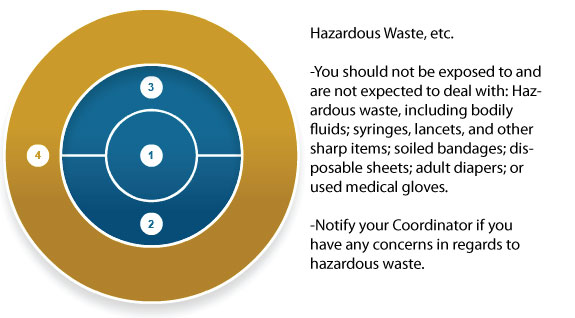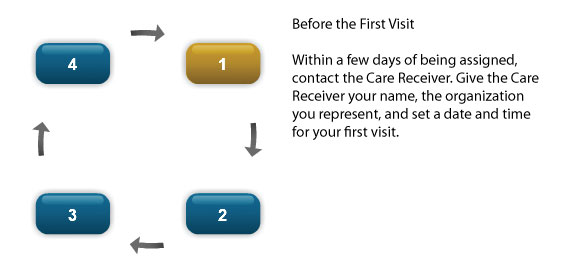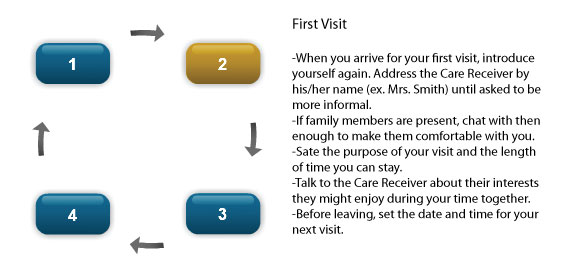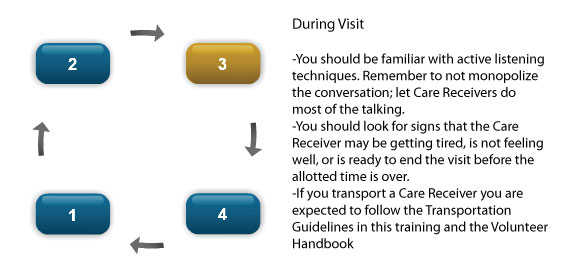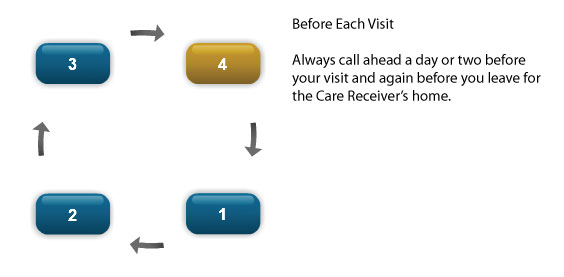Respite/Caregiver Support Services
A respite volunteer acts as a companion for a care receiver so that family caregivers can have respite, or temporary relief from their caregiving responsibilities. Family caregivers often dedicate all their energy to meeting the needs of their relative and jeopardize their own health or emotional well‐being in the process. Respite allows a spouse or adult child to take a well‐deserved break so that they can tend to their own needs (e.g., go to the doctor), run errands unhurried, or simply do something fun. Thus, respite benefits two people at one time‐‐the care receiver and the primary family caregiver.
Respite services are coordinated by each local organization’s staff and are provided for family caregivers of adults who should not be left alone. For example, care receivers may:
- Have dementia due to Alzheimer’s, Parkinson’s, stroke or other illness
- Be confined to a wheelchair or bed
- Be too frail to call 911.
Respite volunteers typically spend 2 to 3 hours per visit in the home on a weekly, every other week, or monthly basis. Sometimes family caregivers request volunteers in the hope of providing activities, social stimulation and friendship to a care receiver whose social network and abilities are changing. The family will identify activities that the volunteer and care receiver can enjoy together.
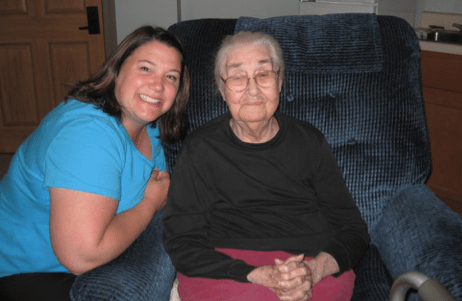
- Socializing
- Eating lunch together
- Watching TV, listening to music
- Playing cards or games
- Going on outings, going for a walk
Do's
– Call the day before your scheduled visit to confirm.
– Carry with you the emergency contact numbers and know where the family keeps the care receiver’s current list of medications.
– Let your organization know as soon as possible if you will not be able to keep your scheduled appointment as a substitute respite volunteer may be available.
– If you transport a care receiver you are expected to follow the Transportation Guidelines as detailed in the
Volunteer Handbook.
Don'ts
– Don’t let the care receiver wander off or do anything unsafe.
– You may not provide any assistance with personal care or counting out or administering medications.
– Don’t provide the family your personal phone numbers. However, if after 3-4 visits you feel comfortable sharing your contact information that is permissible. If the family is trying to reach you, encourage them to keep the coordinator in the loop by working through your organization’s local office for Scheduling.
Concerns
If you have any concerns, recognize a need for more care than you can provide, or feel dissatisfied with the respite care assignment please contact your local coordinator.
Light Housekeeping
“More important than the hour or two spent cleaning is the presence of a friend, someone to talk with, laugh with, reminisce with; all services include a friendly visit”
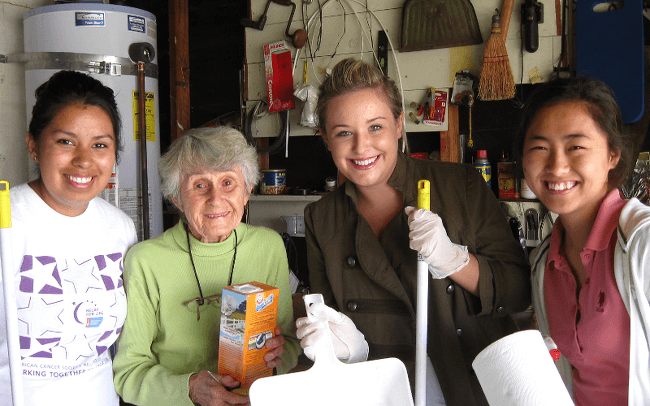
Friendly Visiting
Volunteers provide friendship and companionship for older adults and adults with disabilities who may be lonely and socially isolated. Every effort is made to match volunteers with care receivers according to interests, availability, geographic location, or by similarities between the care receiver and the volunteer.
Volunteers usually commit to one to two hours per visit‐‐ either weekly, every other week or monthly‐‐depending on the volunteer’s availability and the care receiver’s needs.
Volunteers should be familiar with active listening technique; care receivers prefer to do most of the talking. Active listening is a way of listening and responding that increases mutual understanding:
1. Look at the care receiver as they speak, avoid distractions, and pay attention to their body language.
2. Use facial expressions, an open and inviting posture, nod as appropriate, and encourage the speaker with words like “yes” and “uh huh.”
3. Reflect what you have heard by paraphrasing, asking clarifying questions, and summarizing what the care receiver has said.
Time Commitment
– Volunteers usually commit to 1-2 hours per visit either weekly, every other week, or monthly. (Often this is about 2-4 hours a week of service on average)
– The time commitment depends on your availability and the care receiver’s needs.
– It is important that you do not do more hours then you are able to commit to. Your program does not want you to over extend yourself and then no longer be able to volunteer. These friendly visits can last years and we love when they do.
Possible Activities
Some activities you and the care receiver can do together are:
– Visit or talk in the care receiver’s home.
– Watch TV or a movie together.
– Play games or cards.
– Enjoy a hobby together.

Paperwork
Volunteers provide assistance for care receivers who need help with handling, sorting and organizing their mail and other paperwork. Typically volunteers will offer this service once or twice per month on an ongoing basis, although there are also requests for short‐term or occasional assistance.
Volunteers also provide assistance with paperwork by helping care receivers:
- Sort through mail to separate important items from junk.
- Shred or cut up throw‐away mail or other documents to prevent identity theft.
- Organize papers, bills, mail, important documents.
- File, or set up a filing system, so that important paperwork and documents can be retrieved easily if needed (e.g., Medicare and Social Security documents, medical bills, bank statements, wills, living wills, powers‐of‐attorney).
- Write letters or notes or assist with other correspondence.
- Put important dates on the calendar (e.g., medical and other appointments, bill due dates).
- Fill out applications and other forms, except for forms related to money management, medical information, or legal issues. The care receiver must provide all responses needed to complete the permitted forms.
Don'ts
– Don’t assist with money management, bill paying, or to provide any other type of financial assistance.
– Don’t offer advice regarding investments, insurance, choice of banks, or related financial matters.
– Don’t write checks or balance bank statements.
– Don’t sign checks or other legal documents of any kind for the care receiver.
– Don’t be named on any bank account, insurance policy or other document as a co‐signer or beneficiary of funds
– Don’t accept any form of power of attorney or permission to act on behalf of the care receiver.
Contact your local coordinator if you have any questions about your responsibilities in regards to paperwork for your care receiver.
Do's
– Do call to arrange a day and time for the service.
– Do discuss what work needs to be done to plan adequate time
to complete the duties.
– Do plan to spend an hour to an hour and half per visit.
– At the conclusion of your visit, do schedule your next visit.
Light Yard Work
Volunteers provide light yard work services for care receivers who live in their own homes. These services focus on essential yard maintenance and safety. These services are usually seasonal and often provided on an “as needed” basis.
Light yard work services may include:
- Mowing grass and trimming yard.
- Raking leaves in the spring and fall.
- Trimming bushes and shrubs around walkways and beside the house.
- Raking, picking up, and bagging small debris.
- Removing vines.
- Trimming small, low tree branches that present a safety hazard.
- Snow shoveling in situations of medical necessity.
Safety First
Your safety and the safety of the care receiver is your number one priority.
Equipment and Gear
– You may need to provide your own equipment if the care receiver does not have these tools or if you prefer to use your own equipment.
– Wear appropriate clothing and protective gear.
– Be familiar with the equipment and use it appropriately.
Confirm Details
Call the care receiver to arrange the day and time for the service; discuss the work to be done and schedule enough time to complete the tasks.
Next Appointment
If work isn’t completed or if there is an ongoing assignment, schedule the next appointment before leaving or notify your coordinator about the remaining work.
Yard Debris
Discuss removal of yard debris with your care receiver. Your care receiver is responsible for providing bags, making arrangements for and any fees to remove the debris.
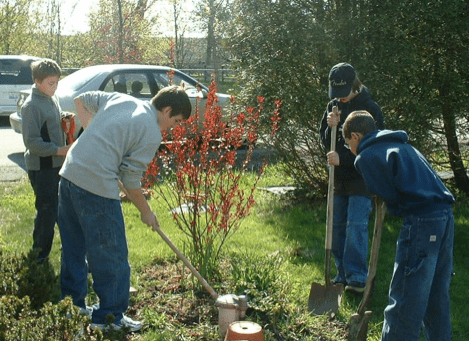
Minor Home Repairs
Skilled volunteers perform various repairs based upon their availability and skills. Volunteers need to be aware of their own limitations and avoid tasks that could cause injuries.
Volunteers around the nation have given an amazing array of services to their senior neighbors.
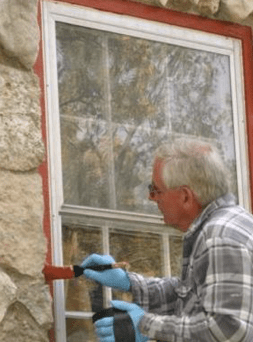
Assessment
– Do a thorough assessment of the job to be completed:
– Do you have the necessary skills?
– Do you have the right equipment?
– Ensure the care receiver will provide supplies.
Attire
– Dress appropriately for the task to be accomplished including:
– Ensure proper footwear.
– Wear safety glasses when using tools or equipment that could cause flying debris.
– Gloves are recommended.
Proper Equipment Use
– Use power equipment only in daylight or where there is good artificial light.
– Allow engines of power equipment to cool before storing; do not store near any open flame or where gasoline fumes may be ignited by a spark.
Safety
-Never allow children to operate mechanical equipment.
– Take precautions on hot, sunny days or in extremely cold weather.
– Use extreme caution if climbing a ladder; be sure it is steady and grounded and have another volunteer hold the ladder if possible.
– If you will be using chemicals, such as paint, make sure the area is properly ventilated.
